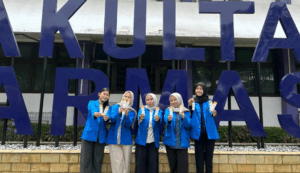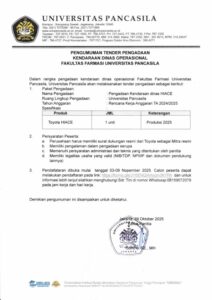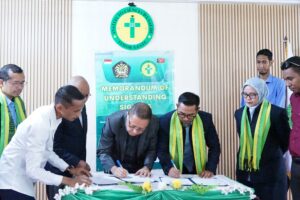Lecturer at the Faculty of Pharmacy, Pancasila University, Dra. Kartiningsih, M.Si., Apt. won a Doctorate degree in Pharmaceutical Sciences for his dissertation entitled “Formulation of Crud Fucoidan Nanoparticle Tablets Brown Seaweed Extract (Sargassum polycystum) as Platelet Antiaggregation” on (28/08), this open meeting was held online through the Zoom Meeting application. In his dissertation, based on Basic Health Research (RISKESDAS) data from the Ministry of Health of the Republic of Indonesia in 2018 it stated that the prevalence or total cases of heart disease in Indonesians of all ages was 1.5 % of the total population of Indonesia. One of the causes of heart disease is the occurrence of platelet aggregation or what is known as blockage of the blood vessels. The occurrence of blockages in blood vessels can be triggered due to metabolic disorders in the body, unhealthy lifestyles, and others.
There are several options for treating heart disease caused by blocked blood vessels, including chemical drugs that are widely available in the market and also come from natural ingredients. Chemical drugs that have been widely used generally have a good effect on healing a disease, but it is known that the side effects they cause are also large. So, to minimize the side effects of these chemical drugs, nutritious ingredients from plants or what are often known as herbal medicines are chosen.
Seaweed or what is known as seaweed is one of the natural resources from Indonesian waters. Most people know the benefits of seaweed only as an ingredient for making jelly, a food source, providing aesthetic value or beauty in Indonesian waters, and functioning to maintain the balance of marine ecosystems. Seaweed lives attached to coral reefs on the sea lips at a depth of 3-10 meters above sea level, this is one of the triggers for the very ease of obtaining seaweed in Indonesian waters. The use of seaweed can provide positive values in all aspects, such as being a source of livelihood, maintaining the balance of marine biota ecosystems, being a source of food, and so on.
There are many types of seaweed that are spread in Indonesian waters, one of which is brown seaweed which has various benefits in the health sector such as, as an antioxidant or antidote to toxins, anticancer, anti-obesity, anti-cholesterol, and can be used to treat blockages in blood vessels that trigger onset of heart disease. In brown seaweed there is a compound, namely fucoidan which has many benefits, one of which is as an anti-platelet aggregator or overcoming the blockage of blood vessels.
Research on the use of brown seaweed as a platelet anti-aggregator has not been widely developed in Indonesia. In this study, fucoidan was used which was obtained by extracting brown seaweed from Cicalobak Beach, Garut Regency. The obtained fucoidan was reduced in molecular weight using acid hydrolysis, hydrolysis with cellulase enzymes, and degradation using Gamma irradiation. Fucoidan which has been reduced in molecular weight is formed into a nanoparticle. Nanoparticles are a new breakthrough in the pharmaceutical field, one of which aims to increase the efficacy of fucoidan as a platelet anti-aggregator.
In order to be used in the wider community, the fucoidan and fucoidan nanoparticles that have been obtained are formed into a pharmaceutical preparation, namely a tablet preparation. The anti-platelet aggregation activity of fucoidan has been proven by testing in vitro (using a spectrophotometer) and in vivo (using experimental animals). Based on the research results, the anti-platelet anti-aggregation activity of fucoidan tablets, fucoidan nanoparticle tablets, was compared with a chemical drug that has been circulating in the market. It was found that activity as a better anti-platelet aggregator was found in fucoidan nanoparticle tablets of brown seaweed extract, compared to those of krud fucoidan tablets.




